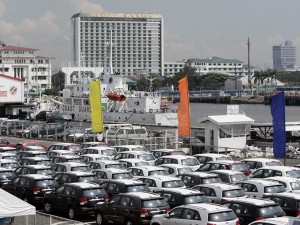BSP: Business sentiment still upbeat in Q2

STILL UPBEAT Business sentiment in the Philippines remains positive, according to the Bangko Sentral ng Pilipinas. The latest Business Expectation Survey of the BSP, which was conducted from April 2 to May 11, 2012, notes that the business confidence index for the second quarter stood at +44.5 percent, better than the +40.5 percent registered in the previous quarter. AP Photo/Pat Roque
Business sentiment in the Philippines remains positive, bolstering government claims that the country can withstand the adverse effects of a prolonged debt crisis in the eurozone.
According to the Bangko Sentral ng Pilipinas’ latest Business Expectation Survey (BES), the business confidence index for the second quarter stood at +44.5 percent, better than the +40.5 percent registered in the previous quarter and the +31.8 percent in the second quarter of 2011.
Respondents said they remained optimistic about their income prospects because of their ability to secure additional business contracts, while citing a general expansion mode of businesses that is seen to drive future demand, said Teresita Deveza, acting deputy director for the statistics department of the BSP.
Respondents also cited favorable macroeconomic indicators, including benign inflation, low interest rates, increase in public spending, and steady growth in remittances from overseas Filipino workers, she added. All these indicators support potentially higher demand for goods and services in the months ahead.
A positive index means that the percentage of respondents who are optimistic about their profitability and the economy’s growth potentials is higher than the percentage of those who believe otherwise.
Article continues after this advertisement“Business sentiment edged even higher in the second quarter. This is the fourth consecutive quarter of an improving business sentiment,” BSP Assistant Governor Ma. Cyd Tuano-Amador said.
Article continues after this advertisementAmador said optimism among businesses would help the country attain its economic growth targets for the year.
This is because positive sentiment among enterprises leads to investments, she said, explaining that there is a significant correlation between business sentiment and actual growth of the economy.
The positive sentiment of businesses in the country came amid pronouncements from the government that the Philippines will be able to withstand the ill effects of the debt woes of Europe.
The central bank said the country would not be totally immune from the adverse impact of the crisis in the Western region, but the effect on the Philippines would be something it could absorb.
According to BSP Governor Amando Tetangco Jr., the Philippine economy is still poised to grow even if the crisis in the eurozone were to persist over the short to medium term.
“For sure, there will be greater market volatility (arising from the eurozone crisis), but (the Philippines) will be able to absorb any shock because of our sources of resilience,” Tetangco said.
These sources of strength, he said, include the government’s ability to implement more stimulus measures if necessary given its improving debt burden and its ability to further cut key policy rates.
Even if the BSP’s policy rates, which influence commercial interest rates, are at historic lows of 4 and 6 percent for overnight borrowing and lending, the monetary policy can still be adjusted if the central bank deems it necessary to further boost growth of the economy, economists said.
Compared with the key interest rates of the United States that are already at near zero, interest rates in the Philippines are higher.
The government expects the Philippine economy to grow between 5 and 6 percent this year, faster than last year’s 3.7 percent.
The latest Business Expectation Survey of the BSP, which was conducted from April 2 to May 11, covered 1,587 enterprises nationwide. The survey had a response rate of 79.6 percent.